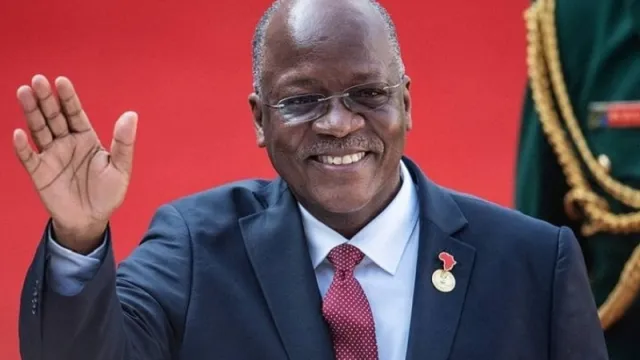John Magufuli: the ‘bulldozer’ who made Tanzania outlier in Covid-19 fight

John Magufuli: the ‘bulldozer’ who made Tanzania outlier in Covid-19 fight
While countries across the world scrambled for Covid-19 vaccine, the late Tanzania President Dr John Joseph Magufuli dismissed the effort, saying: “vaccines don’t work.”
For many, Magufuli’s dismissal of the coronavirus shot did not come as a surprise. For nearly a year since Tanzania reported 509 positive cases and 21 deaths in April 2020, the president has been on overdrive, even gaining global notoriety due to his stance that the Covid-19 did not pose any real threat to his country.
From global bodies, to opposition leaders to medics to journalists, Magufuli took on anyone who dared ask Tanzania to sync with the world in the fight against Covid-19. He even discouraged the health ministry from securing vaccines for Tanzania as her neighbors went out to get the lifesaving shots.
Since skipping a virtual meeting of East African heads of state on February 27, Magufuli was never seen in public again. In absence of official updates from his office, rumor mills were busy round-the-clock for two weeks feeding a weary public with details on his status.
Opposition leader Tundu Lissu – currently in exile in Belgium – was one of the most vocal, saying Magufuli was hospitalized battling Covid-19.
On Wednesday night, Tanzania vice-president, Samia Suluhu Hassan, went on state television to announce that Magufuli had died. “Dear Tanzanians, it is sad to announce that today 17 March 2021 around 6pm we lost our brave leader, President John Magufuli, who died from heart illness,” she said.
Read also: WHO calls out Catholic doctors’ lobby on Covid-19 vaccine falsehoods
Hassan – who was born in Zanzibar and studied economics in the UK - has been sworn in to serve for the reminder of the five-year term, becoming the first woman president in Tanzania and also in the East African region.
Lissu tweeted earlier in the day, before Hassan went public on the president’s death: “While preparations for a military parade are going on, the VP is busy touring the country as if nothing is happening. Bob Marley said it all: ‘you can fool some people some time, but you can’t fool all the people all the time. And now we see the light!’”
Hassan said Magufuli died from chronic atrial fibrillation – a health problem that he had been battling for decades - at Mzena Hospital, Dar es Salaam. He will be buried on March 25 in his hometown of Chato.
In the last one year, Magufuli has been under mounting pressure nationally and globally over his outlier stance on management of the coronavirus pandemic.
Sample this: While speaking to a mask less crowd in January, he said, "if the white man was able to come up with vaccinations, then vaccines for Aids would have been brought. Vaccines for tuberculosis would have made it a thing of the past. Vaccines for malaria would have been found. Vaccines for cancer would have been found."
Magufuli’s rhetoric drew condemnation of the World Health Organization as well as the Roman Catholic Church in Tanzania. On 20 February, WHO Director-General Tedros Adhanom statement on Tanzania said: “This situation remains very concerning. I renew my call for Tanzania to start reporting Covid-19 cases and share data. I also call on Tanzania to implement the public health measures that we know work in breaking the chains of transmission, and to prepare for vaccination.”
In the same month, the US embassy in Tanzania warned of “a significant increase in the number of Covid-19 cases.”
Read also: China has pledged 10 million COVID-19 jabs to 53 developing countries
Magufuli was born on 29 October 1959, in Chato, northwestern Tanzania. He graduated with a bachelor’s degree in education from the University of Dar es Salaam and, in 2009, a doctorate in chemistry from the same university.
Magufuli – a staunch Catholic - was elected a member of parliament in his home district of Chato in 1995. He gained national recognition as minister of works from 2010 when he was nicknamed “the bulldozer” for his blunt style of getting things done.
He was first elected president in 2015 on the ruling Chama Cha Mapinduzi party riding on his resolve to fight corruption, restore trust in civil service, and build infrastructure in the expansive country of 60 million people.
His approach, however, turned authoritarian as he went on perceived dissidents hammer and tongs. He banned opposition rallies while edging out non-governmental organizations by denying them permits even as he cracked on journalists critical of his leadership. Young women, who get pregnant, were not spared by Magufuli either as he told them that they could not go back to school even though he did not support birth control.
Last October, he won a second term garnering 84 per cent of the vote in polls that were stained by massive intimidation of the opposition. Election observers were barred from the country even as bank accounts of civil society groups remained frozen. Escorted by Germany, US and Belgian ambassadors, the opposition leader, Tundu Lissu, left the country in November 2020 for Belgium citing widespread irregularities in the polls.
Magufuli’s anti-business sentiments were blamed for investor flight but he also won admiration in the country for standing up to multinationals that were deemed to be exploiting Tanzania. He accused Barrick Gold of declaring less exports that it actually shipped out.
Magufuli is survived by his wife, Janet, and two children.



